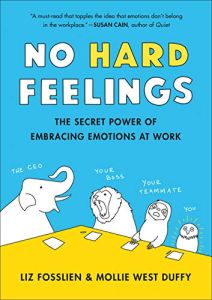Join getAbstract to access the summary!

Join getAbstract to access the summary!
Liz Fosslien and Mollie West Duffy
No Hard Feelings
The Secret Power of Embracing Emotions at Work
Portfolio, 2019
What's inside?
How managing your emotions at work will help you become a more engaged employee.
Recommendation
Every office has an emotional culture. Consultant Liz Fosslien and organizational designer Mollie West Duffy explain why everyone needs to recognize and manage theirs. With charming illustrations and clear prose, they provide straightforward guidelines on “relevant and irrelevant emotions” and communication techniques. The authors provide additional resources about gender, race, age and cultural issues. Their checklists include how to observe and overcome unhelpful emotional behaviors and biases, and will make you more self-aware as an engaged team member or leader.
Summary
About the Authors
Liz Fosslien is a marketing and design consultant. Organizational designer Mollie West Duffy writes for Fast Company and Quartz.

















Comment on this summary